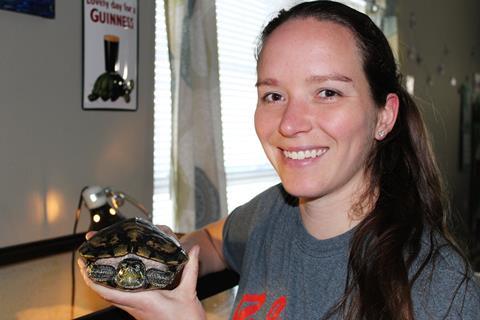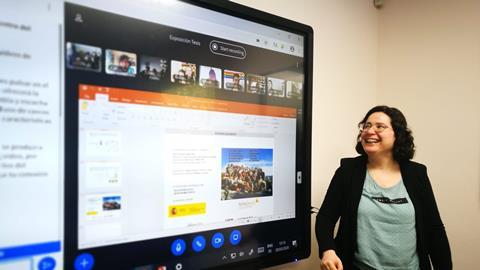The Covid-19 pandemic has forced academics to adopt a new model with some unexpected advantages
When rumours of imminent lockdowns started spreading, many graduate students were faced with the possibility of postponing the end of their PhD. However, amid the uncertainty about how long restrictions associated with the Covid-19 pandemic will last, most institutions have been understanding and supportive, adapting regulations to accommodate online PhD vivas and thesis defences. A new generation of proud digital doctors is out there.
‘I was really worried that they wouldn’t allow [online exams] and they would force me to delay my defence,’ says Molly Sung, from the University of Toronto, Canada. Sung found out just a week after her university shut down that she would be able to defend online. Over in Europe, Stefanie Kickinger, from the University of Wien, Austria, had started planning for an in-person defence when it became obvious that examiners would not be able to travel. ‘We contacted them three weeks before the defence, and everyone agreed – an online thesis [defence] was the best solution,’ she explains. ‘Luckily, it all went very well.’
Going public
In many parts of the world, a public presentation forms part of the PhD defence process. Some students have found a silver lining to this moving online – it’s a great chance to share their research with people around the world. After Erin Hancock, from Indiana University, US, posted the link to her defence on social media, she received a lot of unexpected attendees from different research areas. She even drew the attention of potential employers: ‘I got to meet new people from pharmaceutical companies,’ she says.
Phillip Hudson, from the University of South Florida, US, also found this ability to reach a wider audience to be a highlight of his online experience. Hudson livestreamed his defence live on Youtube and Facebook, which generated a lot of interest among the community. ‘Many people joined in, and it even sparked some new research collaborations,’ he comments. ‘This is a total game-changer – usually just a handful of people will read your PhD dissertation.’
Technical challenges
Although most institutions have stepped up and will take care of the technical aspects of the viva, digital doctors have to become proficient users of online webinar platforms. Setting up rehearsals before the real deal helps. That way ‘technical difficulties come up early, and you can fix everything before the defence,’ says Sung. Another key aspect is making the virtual room secure. ‘I added a password and didn’t experience “zoom-bombing”, but I have heard this is a common problem,’ says Miranda Adams, from Saint Louis University, US.

If your viva involves giving a presentation, extra thought needs to be given to how it will look to your audience. ‘Some parts of your shared screen are not visible on certain devices, so you need to be extra careful when you create the slides,’ explains Kickinger. Adams also remarks on the importance of design: ‘Slides need to be especially engaging, with attractive figures.’
Going digital has been a challenge for some academic institutions burdened with bureaucracy. One of Kickinger’s colleagues is encountering problems with setting up her viva. ‘She couldn’t submit all the paperwork before the lockdown, and our administrators are slowly adjusting to the new standards,’ explains Kickinger. While Dolores Bueno from ICMAB, Spain, was permitted to defend her thesis online, the University of Barcelona required the examiners to submit hard copies of the paperwork by post. ‘In fact, the head of my committee said an online defence was illegal,’ she comments (he was overruled). Enrique Gil de Montes, from the University of Sevilla, Spain, has not received a final mark yet due to administrative hurdles; normally the examiners sign off on the paperwork at the defence. ‘It’s total bureau-crazy,’ he jokes.
Party time

None of these complications spoiled celebrations. Gil de Montes, who had dressed up for the occasion, virtually partied with over 100 people after his defence. Sung could not celebrate with her colleagues, but her housemates surprised her with a take-away barbecue dinner, homemade biscuits and a bottle of bubbly. And everyone hopes to celebrate with a real gathering soon. ‘We will have plenty of time once this gets better,’ says Hudson.
At those parties they’ll have plenty of unusual viva anecdotes to entertain everybody with. Hancock’s pet turtle Tert interrupted her presentation with weird noises, and Sung’s flatmates had to entertain her cat Nutmeg to keep her from loudly meowing during the exam. Adams’ in-laws had never used Zoom before, and jumped into the virtual room looking very confused, and Kickinger’s proud dad delivered an unexpected speech. But with preparation and professionalism, candidates can be ready for anything, as Gil de Montes found out when his committee asked him to stand up: ‘Thank God I was wearing a full suit!’
Six tips for a successful online viva
1. Ensure a good and stable internet connection – ideally use an ethernet cable rather than wireless – and remember to password-protect your virtual venue.
2. Practice as much as you can, ideally in the same place you will use during your defence. Get used to the space and the environment – this is also good advice for in-person presentations. Set-up a full rehearsal with your colleagues to make sure everything works smoothly.
3. Have a list of instructions ready for your committee, family and friends. It can include information on how to access the online platform and some basic ‘netiquette’ rules: mute microphones, send the questions through the chat, switch off cameras to save bandwidth.
4. Have some water ready – you will need it during the defence, and it will also help you take your time (talking without an audience often makes you speed up more than you realise). You may also have some champagne nearby for later!
5. Keep quiet: turn off your phone, all the notifications in your laptop, and make sure all your pets are out of the room.
6. Don’t forget to wear trousers – you never know – and just enjoy! Relax and try to have fun – if you have made it this far, you are ready to graduate.













No comments yet